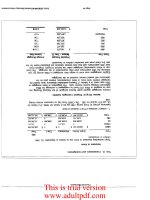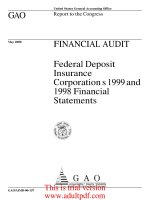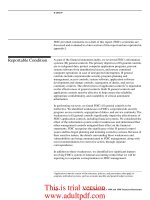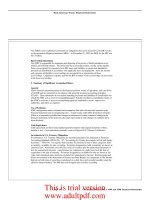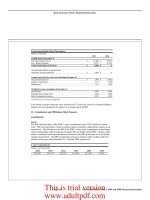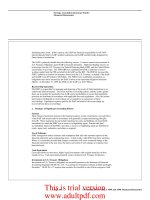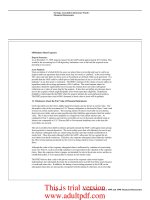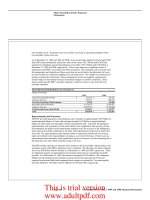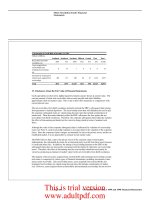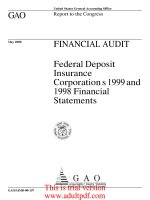United States General Accounting Office GAO May 2000 Report to the Congress_part6 doc
Bạn đang xem bản rút gọn của tài liệu. Xem và tải ngay bản đầy đủ của tài liệu tại đây (23.46 KB, 1 trang )
Savings Association Insurance Fund’s
Financial Statements
Page 49 GAO/AIMD-00-157 FDIC’s 1999 and 1998 Financial Statements
Off-Balance-Sheet Exposure
Deposit Insurance
As of December 31, 1999, deposits insured by the SAIF totaled approximately $711 billion. This
would be the accounting loss if all depository institutions
were to fail and the acquired assets
provided no recoveries.
Asset Putbacks
Upon resolution of a failed thrift, the assets are placed into receivership and may be sold to an
acquirer under an agreement that certain assets may be resold, or “putback,” to the receivership.
The values and time limits for these assets to be putback are defined within each agreement. It is
possible that the SAIF could be called upon to fund the purchase of any or all of the “unexpired
putbacks” at any time prior to expiration. The FDIC's estimate of the volume of assets subject to
repurchase under the existing agreements is $40.1 million. The actual amount subject to
repurchase should be significantly lower because the estimate does not reflect subsequent
collections on or sales of assets kept by the acquirer. It also does not reflect any decrease due to
acts by the acquirers which might disqualify assets from repurchase eligibility. Repurchase
eligibility is determined by the FDIC when the acquirer initiates the asset putback procedures.
The FDIC projects that a total of $443 thousand in book value of assets will be putback.
11. Disclosures About the Fair Value of Financial Instruments
Cash equivalents are short-term, highly liquid investments and are shown at current value. The
fair market value of the investment in U.S. Treasury obligations is disclosed in Notes 3 and 4 and
is based on current market prices. The carrying amount of interest receivable on investments,
short-term receivables, and accounts payable and other liabilities approximates their fair market
value. This is due to their short maturities or comparisons with current interest rates. As
explained in Note 3, entrance and exit fees receivables are net of discounts calculated using an
interest rate comparable to U.S. Treasury Bill or Government bond/note rates at the time the
receivables are accrued.
The net receivables from thrift resolutions primarily include the SAIF’s subrogated claim arising
from payments to insured depositors. The receivership assets that will ultimately be used to pay
the corporate subrogated claim are valued using discount rates that include consideration of
market risk. These discounts ultimately affect the SAIF’s allowance for loss against the net
receivables from thrift resolutions. Therefore, the corporate subrogated claim indirectly includes
the effect of discounting and should not be viewed as being stated in terms of nominal cash
flows.
Although the value of the corporate subrogated claim is influenced by valuation of receivership
assets (see Note 5), such receivership valuation is not equivalent to the valuation of the corporate
claim. Since the corporate claim is unique, not intended for sale to the private sector, and has no
established market, it is not practicable to estimate its fair market value.
The FDIC believes that a sale to the private sector of the corporate claim would require
indeterminate, but substantial discounts for an interested party to profit from these assets because
of credit and other risks. In addition, the timing of receivership payments to the SAIF on the
subrogated claim does not necessarily correspond with the timing of collections on receivership
This is trial version
www.adultpdf.com
